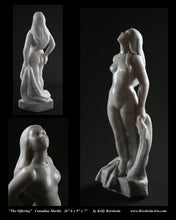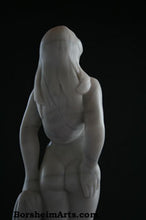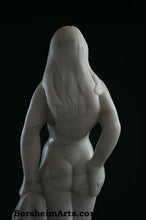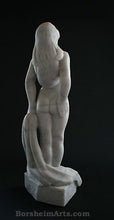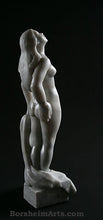
- Stone
- 26 x 9 x 7 inches
- Sold, Private Collection, Georgetown, Texas
The Offering
Canadian Marble
one of a kind
26" h x 9" x 7"
© 2002-9 Kelly Borsheim
This may have been the first piece of Canadian marble that I carved when I ordered 2000 pounds of stone to my home and studio in central Texas. But it was also one of the last ones I finished. It is an unusual stone in that the veining appears to run in many different directions, making it a bit difficult to know which way the bedding plane of the stone lies. It was a hard marble, as I was to find out where most all of the marbles in that lot. However, I found this marble to be fun to carve and very beautiful.
After the attacks of September 11, 2001, the then-US President George W. Bush decided to lock down America's borders. I was less than pleased. It seemed like an action similar to the "throwing out the baby with the bath water" cliché. This action caused me to really examine the meaning of the word 'vulnerability.' I had generally thought of vulnerability as a strength, a gift we can offer of sharing, openness, and honesty. President Bush seemed to see vulnerability as a weakness.
There are, in fact, two types of vulnerability: the kind you have control over and the kind that you do not. An Achilles’ Heel is a good example of vulnerability as a liability. The phrase comes from the legend of the Greek hero Achilles. The story is that his mother Thetis wanted to protect him by dipping him into the River Styx to make her son invulnerable. However, she held her baby by his heel with her thumb and forefinger (a strong mother!), thus blocking the magical waters from reaching all of her child's body. Achilles is said to have died by an arrow shot into this same heel.
I suspect that it was this type of vulnerability, the fatal flaw, that President George W. Bush was thinking about then.
In body language, one exhibits a lack of fear by exposing one’s torso. You will see this in many painted and sculptural depictions of political leaders. In essence, a brave and secure person is sending the message, “I can chose to be vulnerable to you and remain strong, too.” (The opposite position would be the curled up, closed fetal position that is designed to keep us safe. Our skeleton protects our vulnerable bellies.)
Thus the idea for my next sculpture The Offering was born: Our CHOICE to be VULNERABLE.
Direct Carving Design of Marble Sculpture
Starting out with this marble from Canada:
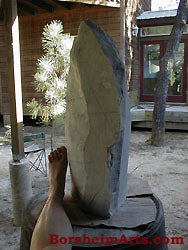

Originally, I thought I would make the figure's hair be really long and curve in such a way that it repeated the lines in the drapery from the back view. But later, I decided it was more beautiful to show more of the figure.


Shown here with another marble carving Adam.
A Direct Carver
Many sculptors today and throughout history have created marble sculptures by first creating their compositions in another material, such as clay, in which the artist may add or remove material to get the composition exactly as intended. While the initial idea may be created in a small size, an enlargement would later be made, also in clay, or perhaps then cast into plaster. Then, using a system of measuring specific points, a copy in marble at the same size would be cut.
However, I have not learned this technique. I am a direct carver. That means that I draw directly on a piece of stone and then cut away what is not part of my drawing. Stone carving, for me, is certainly the most challenging and intellectually stimulating of all the arts, and while I enjoy creating in many mediums, stone is my drug of choice.
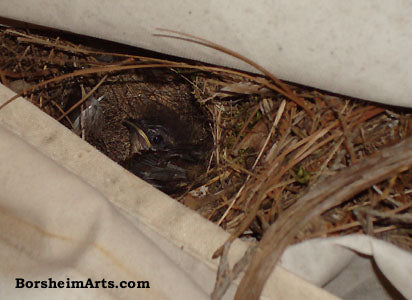
In September 2008, I visited my friend Vasily Fedorouk in the Chicago area. Then I flew to Florence, Italy, and worked there for about nine months. These baby birds arrived soon after I returned to my studio in Texas. The nest is near some of my carving stands hidden in the folds of an old tarp.

Polishing Stone
The Beginning of the End: There is a point in each stone carving in which I change to using hand tools. And often I also begin a love-hate relationship with my work. Luckily, the hate part comes first and as I continue through the process, I am rewarded and the hate dissipates and the love of the stone returns in all of her glory.

I am referring to the finishing part. The overall form is there. Now I refine the line by eliminating "cellulite." I want the sculpture to feel as good as she looks. I begin this process by using a very coarse flat file and work over the entire surface, almost regardless of the final texture. I am still sculpting at this point as well as refining the line. In the image above, I added red arrows to show you how the file scuffs white marks into the stone as is rubs away the high spots. The lower areas tend to be darker.
Once I am satisfied with how the stone feels and how the line from many views looks, I move to a finer file. Each successful sanding removes the tool marks of the file before. This takes a very long time to do properly, but as I said, the more I work, the softer the marble looks. The way the light wraps around the form is enhanced. 


When I draw with charcoal or pencil, I first design my gesture and then I design the shapes of the shadows (or the light). In much the same way, I can turn my stone sculpture to various positions to see how the line between dark and light changes. I work to create variety -- a hard edge in some places, softer in others. I work to vary the shapes to let the eye dance. I want to create intrigue -- for me and for you.



In the image below, you may see some of the sparkles caused when light hits the marble crystals. Marble shimmers in a subtle way. The circular ring of white on the left appears over the figure's belly. I could have carved down beneath it, but I wanted a more curvaceous form and I like the appearance of the natural stone here.
If you would like to see more on the creation of this marble sculpture, please click on the artist's blog links below:
Canadian Marble (before)
Vulnerability - Achilles' Heal
The Other President George
Direct Stone Carver





